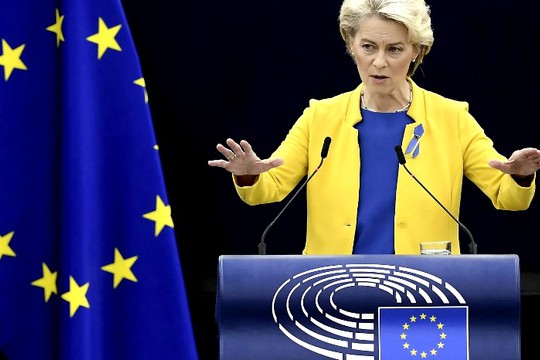Her power grab was complete. After unveiling her new team, the European Commission president Ursula von der Leyen (photo) holds more influence than ever, POLITICO stresses.
When Ursula von der Leyen unveiled her team for the next European Commission, she simultaneously silenced the doubters about who was really in charge in Brussels.
As she revealed the 26 commissioners and their roles to the public, one point was immediately clear: she would have unfettered control over European Union politics. In a matter of minutes, she introduced a big title with little responsibility for one of the most powerful countries in the European Union, she propped up her buddies, and she diluted powerful portfolios by dividing them among multiple people.
“She will be even more in control of everything,” said one EU official who, like others quoted in this piece, was granted anonymity to speak freely. “Who thought that was even possible?”
It was the culmination of months of public and private strategy to remove the dissenting voices of her first term as European Commission president. From the first team, none of the naysayers remain. Big personalities such as France’s Thierry Breton and the Netherlands’ Frans Timmermans are now gone.
During her first term — in which she faced a global pandemic and a war on the EU’s doorstep — she developed a reputation for making unilateral decisions, overstepping her job description, cutting other EU leaders out of the decision-making, and speaking only to a handful of advisers. As a result, she gained the nickname Queen Ursula in Brussels.
The morning of von der Leyen’s announcement of her second top team, she refused to tell the European Parliament, her partners in the process of approving commissioners, who she was assigning to which job. Instead, she left a meeting with the Parliament’s top leaders and went straight into a press conference in which she revealed all the details. She was later accused of “contempt” for the Parliament.
Hours before, she convinced the French she would give their commissioner nominee an exceptionally important job if they swapped out Breton. On Tuesday, as she revealed job descriptions, they realized they’d been bamboozled into a watered-down position.
“Anyone who thought that she could have changed her style, her will to keep tight control, was at the very least naive,” said an EU diplomat.
Ripping up the old org chart, von der Leyen said she was ridding the Commission of “the former relatively rigid stovepipes,” making the institution less hierarchical.
She claimed it would allow for greater cooperation between commissioners, and their civil servants, and give them an “equal responsibility” to deliver on their priorities. But EU diplomats and officials, including some of her own employees in the Commission, say her new structure will allow von der Leyen to divide and conquer.
“I don’t think that is a bug but a feature in the system of the new college,” said René Repasi, who leads the German Socialists in the European Parliament, of von der Leyen’s strategy.
While the socialists, the second biggest political force in the European Parliament, secured a mega portfolio for Spain’s Teresa Ribera, including the powerful competition job, elsewhere they were left with less important portfolios and inflated job titles. Von der Leyen announced that little-known socialist Romanian nominee Roxana Mînzatu would be the executive vice president for people, skills and preparedness.
As an added buffer, she’s set up trusted loyalists such as Slovakia’s Maroš Šefčovič, Latvia’s Valdis Dombrovskis and Dutchman Wopke Hoekstra to be “the guard dogs” keeping their new colleagues in check, a second EU diplomat said.
She was even ruthless with her ally Emmanuel Macron, who, along with then-German Chancellor Angela Merkel, pushed for her to get the Commission job back in 2019.
One day before her announcement, France swapped Breton for the less experienced Stéphane Séjourné, having been guaranteed a more powerful role by von der Leyen if her biggest internal critic was axed.
But French officials feel von der Leyen played Macron, giving his protege Séjourné a weaker job than the one Breton had.
Von der Leyen amassing power shouldn’t come as a surprise.
Once powerful leaders who steered the EU are weakened, leaving a void for von der Leyen to fill. France’s Macron suffered a major loss in June’s European election to the far-right and then went through a bruising national vote. German Chancellor Olaf Scholz is worried about his own future and Polish Prime Minister Donald Tusk is preoccupied with domestic politics.
“You don’t have to teach von der Leyen how to play the power game,” the third EU diplomat said. “She saw the vacuum left by the European capitals and jumped into it.”
She’s also fortunate that former Portuguese Prime Minister António Costa was chosen by EU leaders as her counterpart at the European Council. He may be widely respected but he is not expected to push back against von der Leyen (and certainly is unlikely to butt heads with her, as outgoing Council chief Charles Michel did).
read more in our Telegram-channel https://t.me/The_International_Affairs

 11:00 21.09.2024 •
11:00 21.09.2024 •























